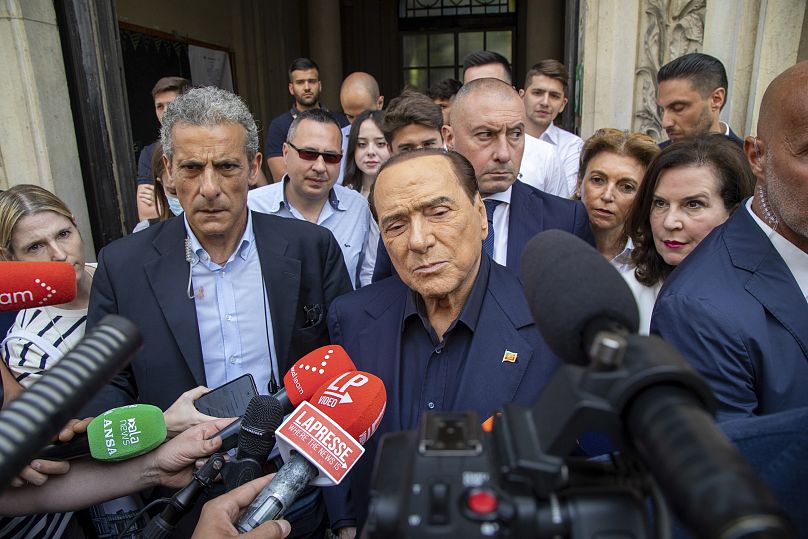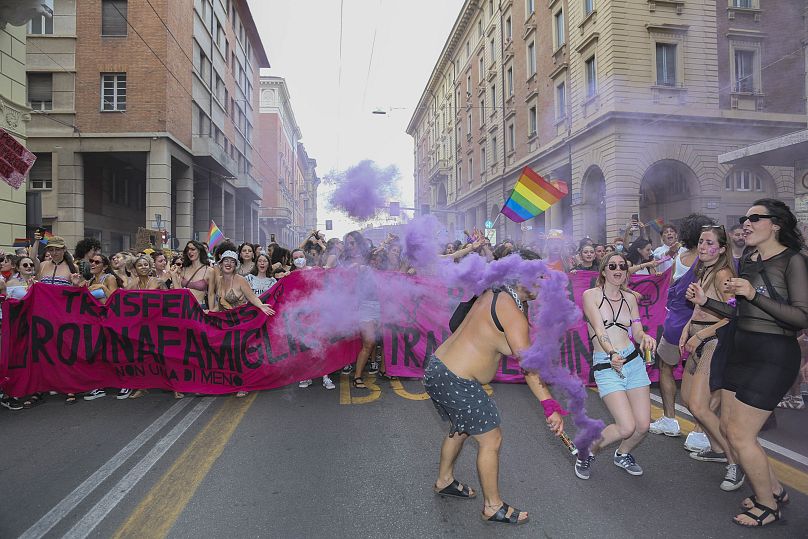Her Brothers of Italy party has emerged as the main opposition ahead of a general election next year.
If Italy's recent local elections were a test of the nation's pulse, then the country could be taking a shift to the right next year.
That's because of the success of Giorgia Meloni's Brothers of Italy (Fratelli d’Italia) party.
It has emerged as Italy's main opposition force and led a right-wing coalition that enjoyed massive gains in the local polls.
With a general election due next year -- and Brothers of Italy topping opinion polls -- the prospect of Meloni being Italy's next prime minister is gathering momentum.
Who is Giorgia Meloni and what does she stand for?
Brothers of Italy's leader Meloni was born and bred in the capital Rome.
Her party's origins lie in the now-defunct Italian Social Movement (Movimento Sociale Italiano), which rebuilt the vanquished Fascist Party from its ruins at the end of World War II and transformed it into a more moderate nationalist force.
The Italian Social Movement was co-founded by Giorgio Almirante, who had been a collaborator and active organiser of the Italian Social Republic, a Nazi puppet state during the war.
Back in 2020, Meloni described Almirante as a “patriot” and lauded his “unconditional love for Italy, his honesty, his coherence, [and] his courage”.
“Brothers of Italy is a party in line with the neo-fascist tradition,” Professor Andrea Mammone, one of Italy’s pre-eminent contemporary historians, told Euronews.
“Many of its members show a positive approach toward Mussolini's regime."
Nevertheless, Meloni -- in politics since the 1990s and formerly minister of youth in Berlusconi’s coalition cabinet -- has crafted the image of being a moderate, palatable politician who has distanced herself from fascist apologists and nostalgics within her party.
Meloni’s current platform is built upon a national-conservative, sovereignist model. She opposes mass immigration and the alleged “Islamisation” of Italy and Europe, calls for stronger law and order, and the relaxation of Italy’s infamously Kafkaesque red tape.
Alongside Salvini, she has also frequently been deemed as one of the country’s first and foremost Eurosceptics, as a result of her criticism of the Euro and “Brussels bureaucrats”.
Euroscepticism itself is typically described as a recent phenomenon in Italy, attributed to political developments following the 1992 Treaty of Maastricht - especially the Eurozone and refugee crises of the past decade.
Nonetheless, it actually traces a much older history in the country, with anti-European sentiment being alive since the 1950s.
Meloni’s recent assertion that “Europe needs a soul” has a striking parallel with a far-right magazine’s headline from 1957, which called the Common Market “Europe without a soul”.
Even more unexpectedly, Italy’s main Eurosceptics were the Communists - polar opposites of Meloni, who yet shared similar protectionist concerns.
In spite of her anti-EU criticism, Meloni remains steadfast in her opposition to a hypothetical “Italexit” and has rebuffed claims that she is “anti-European”.
On social issues, Meloni is staunchly traditional and opposes abortion, euthanasia and same-sex marriage.
What do the local election results mean for Italy?
Local elections often act as a kind of political thermostat, shining a light on the public mood.
The results that have come in from the first round -- a second one is planned for 26 June -- have offered a major confidence boost to the Brothers of Italy, as the party has received the best result within the centre-right coalition, which itself is in the lead, overall.
Recent surveys prop up such trends. The latest results have shown that Brothers of Italy has emerged as the country’s leading party, polling at 22-23% and narrowly edging out the Democratic Party, which comes in second place with 19%.
The centre-left Democratic Party also obtained a favourable outcome - regaining the Northern Italian town of Lodi, for instance - and technically emerged as the most successful single party, with 17.2%. The opposite was true for the once-leading Five Star Movement which suffered a stinging defeat and obtained just 2.1% of the vote share.
Brothers of Italy runs within a centre-right electoral coalition, which includes two parties that are currently in government: Matteo Salvini’s populist, anti-immigration Northern League (Lega Nord), and the enduring ex-PM Silvio Berlusconi’s more moderately conservative Go Italy (Forza Italy).
Notably, the elections also signalled waning support for Salvini, who had brought the League to a (short-lived) government in 2018 and had topped the 2019 European Parliament elections with 34.3% of the vote. League stronghold, Verona, was almost lost to the centre-left and will have to undergo a second round of elections.
Salvini himself had once been seen as responsible for the Northern League’s palingenesis in the 2010s, reversing the formerly secessionist, scandal-ridden party’s failing fortunes. Nevertheless, his party has haemorrhaged nearly half of its supporters since 2020, many of whom have been picked up by Brothers of Italy.
Analysts attribute such losses to Salvini’s failed attempt to call a general election in the summer of 2019 - a manoeuvre which resulted in his accidental self-exclusion from government - and his approach to the Covid-19 pandemic, which was widely perceived as being miscalculated and heavy-handed.
To add insult to injury, a Salvini-backed referendum on justice reform, held on 12 June -- the same day as the local elections -- was ditched after it saw an all-time low voter turnout of 20.9%.
As a result of this, Brothers of Italy could emerge as Italy’s leading party come the 2023 general election. But as Meloni herself exhorted on the Italian television show Porta a Porta, the key to this lies in the centre-right coalition standing together as a unified force.
“The centre-right [coalition] has to stay together,” Francesco Giubilei, a conservative writer and activist, told Euronews. “The moment it splits itself up, it loses.”
“The League is paying for the fact that it’s in the government,” he added. “Brothers of Italy, being in the opposition, is obtaining better results and intercepting a transversal electorate - intercepting disappointed Five Star Movement and League voters, but also voters who see Brothers of Italy as a political force that could potentially form a government, due to Meloni’s conservative shift in the past few months and years.”
When asked about the League’s underwhelming performance at the local elections, party MP Alex Bazzaro shared Giubilei’s sentiment.
“We’re paying for [our] choice to stay in government,” he confessed to Euronews.
How do Italians feel about Giorgia Meloni?
Meloni’s reputation as a coherent, conviction politician has made her popular with a large segment of Italian voters, ranking as one of Italy’s most trusted leaders.
Numerous others, however, do not share such sentiment, and rather see her far-right political baggage as particularly worrisome.
“A cabinet led by her will basically mean Italy following an Orbán-like path - nationalism, anti-EU, anti-immigration, with some tensions with international allies,” warned Mammone, an expert on the Italian far-right. “Moreover, this will lead to a further rehabilitation of fascism.”
For many in the gay community especially, the prospect of Meloni at the helm is particularly worrisome, due to her track record on LGBT+ rights.
“The Italian right is in line with the propaganda upheld by all of Europe’s sovereignist forces, which aim to limit the rights, freedom and self-determination of women and LGBTIQ+ people,” stated Gianmarco Capogna, an activist and spokesperson of the Possibile LGBTI+ organisation. “Meloni fits perfectly in this picture.”
Despite the Senate’s rejection of the anti-homophobia Zan bill last October, Italy has made massive progress on LGBT+ equality in the past decade and has seen a favourable shift in public opinion.
The day before the local elections, Rome hosted its Pride parade, which packed many of the historic centre’s streets and piazzas with tens and potentially hundreds of thousands of people.
A mere two days later, Meloni spoke out against LGBT+ rights at a rally for the Spanish far-right party Vox in Marbella, Andalucía.
“Yes to the natural family, no to the LGBT lobby! Yes to sexual identity, no to gender ideology!” she yelled from the podium.
“We are facing a full-front attack against the fight to demand for equality, which is able to mobilise 900,000 people as we saw last Saturday in Rome,” concluded Capogna. “It isn’t just the LGBTIQ+ community, but the awareness that these battles, our battles, are battles for civility.”













